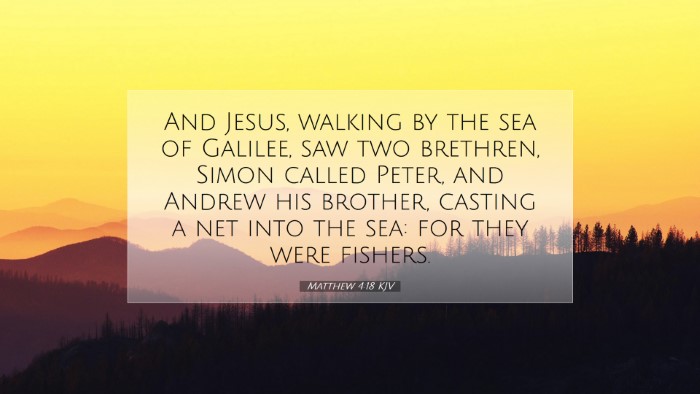Commentary on Matthew 4:18
In Matthew 4:18, we find the account of the calling of Peter and Andrew, two of the earliest disciples of Jesus. This profound moment signifies not just the selection of men for ministry, but a pivotal election that would shape the course of Christianity. This commentary draws insights from various public domain commentaries to illuminate the spiritual, theological, and practical implications of this verse.
Text of Matthew 4:18
"And Jesus, walking by the sea of Galilee, saw two brethren, Simon called Peter, and Andrew his brother, casting a net into the sea: for they were fishers."
Contextual Background
This verse falls within the early ministry of Jesus, shortly after His baptism and temptation. The location by the Sea of Galilee is significant, as it was a hub of fishing activity and where many of Jesus’ followers originated. Understanding the socio-economic context of fishermen helps elucidate the nature of their initial response to Jesus' call.
Significance of the Calling
- Divine Initiative: The calling of Peter and Andrew underscores the theme that God takes the initiative in the process of calling His disciples. Matthew Henry notes that it is Christ who approaches them, which is an emblem of how God seeks out individuals for His purposes.
- Use of Common Occupations: Albert Barnes highlights how Jesus chooses fishermen, indicating that God often uses ordinary people in extraordinary ways. This choice serves as an encouragement to those in unassuming professions, conveying that no vocation is devoid of potential for divine purpose.
- Personal Relationships: The mention of Simon (Peter) and Andrew being brothers suggests the importance of relationships in discipleship. Adam Clarke emphasizes the fact that Jesus cares about familial bonds, which can enrich the community of believers.
Theological Implications
The moment captured in Matthew 4:18 bears significant theological weight, revealing insights into the nature of discipleship and the call to follow Christ.
- Call to Discipleship: The verb “saw” implies a deeper spiritual insight into their hearts and lives. Jesus doesn’t merely see them as fishermen but perceives their potential as fishers of men, as later described in Matthew 4:19.
- Response to the Call: The action of casting nets can be interpreted as a metaphor for their current lives, and when Jesus calls them to follow, He is inviting them to a new mission that goes beyond their existing occupations.
- Transformation of Purpose: Through His call, Jesus transforms their identity from fishermen to “fishers of men”. This signifies the transition of vocation towards an ethical and missional dimension, as suggested by Henry's exegesis on the evolution of how a believer can impact the world.
Practical Applications
For pastors, students, theologians, and scholars, Matthew 4:18 provides a robust framework for discussing the call to ministry and the nature of discipleship.
- Understanding God's Call: Reflect on the ways in which God might be calling individuals into service. This verse encourages believers to remain attentive to God’s calling in daily life.
- Emphasizing Community: Encouragement can be drawn from the familial relationship between Peter and Andrew. Considering how churches can foster not just personal discipleship, but community around discipleship could enhance the church's collective mission.
- Equipping Others: As Jesus transforms the lives of His disciples, there is a call for churches to equip their members for ministry. Whether through formal training or informal mentoring, recognizing the potential in every believer is integral to church life.
Conclusion
Matthew 4:18 is a powerful reminder of Jesus’ intimate involvement in calling individuals into His service. This moment might seem simple, but its implications are profound, reverberating through the ages. The insights from these commentaries provide a rich source of reflection and teaching for all who seek to understand the depths of discipleship in following Jesus. As we consider this verse, may we be inspired to respond to God's calling in our own lives and apply these lessons in our ministry and scholarship.


